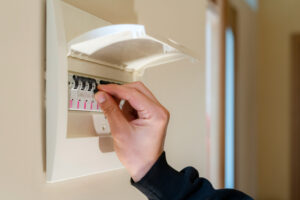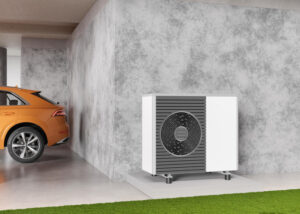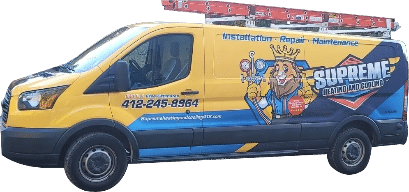Maintaining good indoor air quality is essential for a healthy and comfortable living environment in Penn Hills. Poor air quality can cause a range of health problems and discomfort, affecting your daily life. Many homeowners may be unaware of the common issues that can degrade indoor air quality, such as pollutants, allergens, and inadequate ventilation.
Effective solutions are available to combat poor indoor air quality. By identifying the specific pollutants affecting your home and implementing targeted remedies, you can significantly improve the air you breathe. Read on as we explore the common indoor air quality issues, their health risks, effective solutions, and the benefits of regular maintenance.
Understanding Common Indoor Air Quality Issues
Many factors can degrade the indoor air quality in your Penn Hills home. Identifying these issues is crucial to improving the air you breathe. One of the most common contributors to poor indoor air quality is dust and particulate matter. Dust can accumulate quickly, especially in homes with carpeting or lots of textile materials. These particles can circulate through your HVAC system, leading to increased exposure.
Mold and mildew are also significant concerns, particularly in humid environments or poorly ventilated areas. Mold spores can trigger allergies and respiratory issues. High humidity levels can exacerbate the growth of mold, making it essential to monitor and control indoor humidity.
Chemical pollutants from household products, such as cleaning agents, paints, and pesticides, can also degrade indoor air quality. These chemicals release volatile organic compounds (VOCs) into the air, which can be harmful when inhaled. Inadequate ventilation further aggravates the situation by trapping these pollutants indoors, making it harder for fresh air to circulate.
Pet dander is another common issue, especially for households with furry animals. Pet dander consists of tiny, even microscopic, flecks of skin shed by cats, dogs, rodents, birds, and other animals with fur or feathers. These particles can trigger allergic reactions and worsen asthma symptoms.
Health Risks Associated with Poor Indoor Air Quality
Poor indoor air quality can pose various health risks, especially for vulnerable groups like children, the elderly, and individuals with pre-existing health conditions. One of the most immediate effects of poor air quality is respiratory issues. Contaminants like dust, mold, and pet dander can cause coughing, sneezing, and shortness of breath. Long-term exposure can lead to chronic respiratory conditions such as asthma or worsened allergies.
Chemical pollutants, including VOCs from household products, can have severe health impacts. Short-term exposure to these chemicals can result in headaches, dizziness, and eye irritation. Long-term exposure, however, can lead to more serious conditions such as liver or kidney damage. It is crucial to minimize exposure to these harmful substances by ensuring proper ventilation and using cleaner, less hazardous products.
Poor indoor air quality can also affect mental well-being. Studies have shown that exposure to indoor pollutants can lead to mood swings, anxiety, and even depression. Maintaining good air quality can contribute to better mental health, creating a more comfortable and pleasant living environment.
Individuals with cardiovascular diseases are also at higher risk. Pollutants like particulate matter can enter the bloodstream, potentially leading to heart disease and other cardiovascular problems. By improving indoor air quality, you can significantly reduce these health risks and promote overall well-being for your family.
Regular monitoring and maintenance of indoor air quality are essential to mitigate these health risks. Our professionals can help identify the sources of poor air quality and recommend effective solutions to improve the air you breathe daily.
Effective Solutions for Improving Indoor Air Quality
Addressing poor indoor air quality in your Penn Hills home requires a multi-faceted approach. One of the most effective solutions is to upgrade your home’s ventilation system. Proper ventilation ensures that fresh air circulates throughout your home, removing pollutants and reducing humidity levels. Installing exhaust fans in areas like the kitchen and bathroom can also help in ventilating specific high-moisture zones.
Using high-efficiency particulate air (HEPA) filters is another excellent way to improve indoor air quality. HEPA filters capture tiny particles such as dust, pollen, and mold spores, preventing them from circulating through your HVAC system. Regularly replacing these filters ensures that they work effectively over time.
Air purifiers can also be a valuable addition to your home’s air quality management. These devices work by filtering out airborne contaminants, including bacteria, viruses, and chemical pollutants, making the air cleaner and safer to breathe. Choosing an air purifier that suits your specific needs can significantly enhance your indoor air quality.
Controlling indoor humidity is crucial for reducing mold and mildew growth. Using a dehumidifier can help maintain optimal humidity levels, especially in damp areas like basements. Ensuring your HVAC system is operating correctly can also aid in moisture control. Regularly scheduled HVAC maintenance checks by our professionals can identify potential issues before they become significant problems.
Benefits of Regular Air Quality Maintenance and Professional Services
Regular air quality maintenance offers numerous benefits, starting with the obvious improvement in the air you and your family breathe. Scheduling routine inspections helps identify and address potential issues before they escalate, ensuring that your home’s air remains clean and healthy. Regular maintenance can significantly extend the lifespan of your HVAC system, as clean and well-maintained components operate more efficiently and effectively.
Using professional services for air quality maintenance ensures that you receive expert care tailored to your home’s specific needs. Our professionals possess the knowledge and tools to accurately assess and address any air quality issues, offering targeted solutions that fit your situation. Professional maintenance can also include thorough cleaning and sanitizing of air ducts, which helps remove accumulated dust, allergens, and other contaminants.
Upgrading your thermostat is another beneficial action. Modern thermostats can better regulate your home’s temperature and humidity levels, contributing to improved air quality. Some advanced models even offer air quality monitoring features that alert you when conditions change, prompting timely action.
Regular maintenance also helps save on energy costs. A well-maintained HVAC system operates more efficiently, reducing energy consumption and lowering utility bills. By investing in regular air quality maintenance, you enhance the comfort and safety of your home while also enjoying financial savings.
Conclusion
Maintaining good indoor air quality is essential for the health and comfort of your family in Penn Hills. Understanding the common issues and health risks associated with poor indoor air quality can help you take proactive measures to address these problems. Solutions such as upgrading ventilation, using HEPA filters, controlling humidity, and investing in air purifiers can significantly improve your home’s air quality.
For expert and professional indoor air quality in Penn Hills, contact us at Supreme Heating and Cooling today. Our experienced team is dedicated to providing top-notch solutions to keep your home safe and comfortable year-round.













